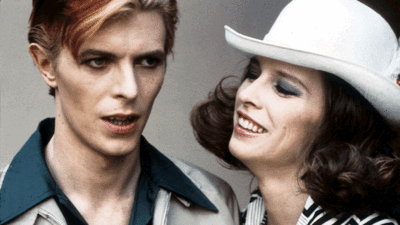There are only a few movies that I have watched many times. Two of them are by Roman Polanski -- "Chinatown" and "The Ghost Writer." And two are by Nicolas Roeg -- "Performance" (co-directed with Donald Cammell) and "The Man Who Fell to Earth." I like the Polanskis for their depth and precision, and the Roegs for their depth and inspiration. These films always seem new.
In 1976's "The Man Who Fell to Earth," the relationship between secret alien Newton (David Bowie) and hotel maid Mary Lou (Candy Clark) says everything about doomed love. Literally from different planets, the man and woman understand each other not at all. But when Mary Lou mutters in the bathtub that Newton doesn't need her, he, although engrossed in a dozen televisions out of earshot, instantly responds, "Yes I do."
The two are opposites. Mary Lou has big American eyes, lips and teeth, which Clark uses to radiate the most natural dumb smile you've ever seen; she's strong enough to carry Newton like a sack of corn when he faints. The English traveler, with his stick frame and professorial distance, barely exists.
Roeg outlines their co-dependence in perfect strokes. The interstellar astronaut gets a nosebleed in the elevator. She offers to revive him with "a nice gin and tonic with four cubes of ice and a slice of lime," her dreamy alcoholic sigh saying it all. He wants only water (scarce in his world), but she will change that.
Each time Mary Lou revisits Newton, she signals the development of their relationship through attire -- first the maid uniform with formica name pin, then a series of outfits in the height of New Mexico Sears couture, but always with a small crucifix hanging at her throat. At first, Newton politely tolerates her. "Am I talking too much?" she whines. "Maybe I ought to go." Newton jumps to screw the top onto her Beefeater, but she continues, "Well, I'll just finish this up and then . . . I think . . . I'll have . . . another one." Newton manages a resigned smile as the cap comes back off the gin, then she, annoyed that he's not attracted to her, insults his scrawn and he gently recaps it.
As Newton graduates to white wine and beyond, Mary Lou masks her dissatisfaction by sacramentalizing her hold over him. "I'll have a bath," she purrs, with a look that indicates what he'll be having. "And tomorrow . . . we'll go to church." Still wearing her crucifix, she stares into her glass and delivers one of the most sincere lines in film: "Lord, I love gin."
Screenwriter Paul Mayersberg (adapting from Walter Tevis' novel) deserves substantial credit for the telegraphic intimacy, as do the performances of the intensely believable Clark and the delicately charismatic Bowie. But the orchestrator is Roeg, who not only details his story with masterful care, but sustains its momentum in the midst of numerous crash cuts spanning space, time and characters. The chaotic totality, just impenetrable enough to demand repeat viewings, defines Roeg's genius.

